|
|
Post by mlm828 on Jul 24, 2005 2:27:55 GMT -5
Although Marty claims in the locker room confrontation at the end of "Seoul Man" that his major complaint is that Dunbar's no team player, I've never thought this was the entire story. Personally(!), I think that's just *part* of why Marty resents Jim and would love to see him gone, and there are other elements: 1. Jim's a senior man, with ten years experience on The Job, and that sets up rivalry right there. Jim knows more than Marty, and that just plain ticks him off. 2. The gun thing. "Tell me that gun on your hip is plastic and we got no beef." Wonder why Marty didn't even bring this up in the locker room, since it nags at him through the entire show? 3. Karen likes Jim -- that's obvious. They have attained, quickly, an easy rapport. An easier rapport than Marty ever had with Karen? Sexual jealousy? Something to think about. 4. Marty is somewhat insensitive, straightforward, uncomplicated emotionally, and an an old school "by the book" cop. Whatever Dunbar's qualifications, or value as a detective past or present, I'll bet you a dollar Russo just plain doesn't think a blind man should be a cop. Let's talk! I agree that Jim's not being a team player is not Marty's only gripe with Jim at the time of "Up on the Roof," but I do think it was the major one, for the following reasons. In their confrontation at the end of "Seoul Man," Jim acknowledges that Marty has a point (about being a team player) and tells Marty he'll do better in this department. Then Jim follows through on this in the following episodes, resulting in a major reduction in the conflict between them. 1. I agree that Jim's greater experience on the job is an important factor in Marty's attitude, especially since Jim (in the early episodes, at least) doesn't let Marty forget it. He often acts as if he knows more than the others and tells them what to do. This had to be a major irritant, especially for Marty. 2. I think the reason Marty did not bring up the issue of the gun again until "Under the Gun" is that there was no occasion for him to do so until that time. Marty was not present and -- as far as we know -- did not know about the two times Jim pulled out his gun after the Pilot (in "Marlon's Brando" and "Seoul Man"). Of course, Marty being Marty, he could have made an issue of the gun even if the occasion hadn't arisen, but for some reason, he didn't. 3. I don't know whether Marty is jealous of the Karen-Jim partnership. We only got a few hints about the relationship between Karen and Marty before Jim's arrival, so this is pretty speculative. It's possible, however. 4. I agree that, in the beginning, Marty thought a blind man should not be a detective. Period. But I think his attitude changed over the course of the series. When he confronts Jim about carrying the gun in "Fancy Footwork," he's coming from an entirely different place than he was in the confrontation in "Seoul Man." He no longer wants Jim out of the squad; he wants Jim to do something which (in Marty's opinion) will make Jim a better detective and the squad a better squad. I don't think Marty would have told Jim he had earned his place in the squad if Marty still thought Jim should not be a detective at all. |
|
|
|
Post by maggiethecat on Jul 24, 2005 11:00:43 GMT -5
Wow! Great thought-provoking stuff. Just a few thoughts off the top of my head:
1. "Jim often acts like he knows more and tells them what to do." Off the top of my head I can't really come up with too many examples where he did this and his judgement wasn't borne out, except for digging up the dog in "Four Feet Under." But Karen put it best, I think, when she called him on acting like he "had something to prove." "I do," he replies, and that pretty much said it all for me. He *does* have something to prove and in the early episodes he's overcompensating like mad. I thought it was understandable behavior, actually. When you're told on the very first day of your job that no one wants to work with you, no one thinks you should be there at all -- you either pack it in or set out to prove that you're the best at what you do. And you try too hard.
In "Seoul Man," it must have driven Marty nuts that when Jim pursued his own instincts in thinking that the perp who ran by him, the Korean father, was *not* part of the pattern . . . well, it turned out Jim was right. As Jim was right about Titus Oliver not shooting Terry, as Jim was right about the mentally challenged man not killing the boy in "Four Feet Under," as Jim was right about the murdered cop's wife and partner in "Rub a Tub Tub." Going back to The Pilot, it was Jim who essentially solved the Tongue Killer case, a case Karen and Marty and Tom had apparently been working on for months. This may be what gets to Marty more than anything else -- Dunbar is a damned good detective. I think that just adds to Marty's insecurities, especially when Tom says things like, "Hey, I'm not too proud to learn from the guy."
Marty tends to see pursuing different lines of inquiry as "not being a team player" (I'm thinking of what he says in the "pissed off stepsisters scene). But more often than not Dunbar's thinking has played out accurately. So when Marty kicks the locker and cries, "Why do you always have to be the guy?" it could mean two things: why do you always have to be the center of attention, i.e. not a team player -- and why are you always right?!"
2. You're right -- why would he have brought up the gun thing here? I was just rambling!
3. Marty is soooo protective of Karen, adopting a sort of big brother persona at times. Okay, wondering if it was some sort of sexual jealousy *is* speculative. Maybe what I meant was that it clearly irritates him that Karen forms a solid working relationship with Jim fairly quickly, and -- from Marty's POV -- takes Jim's *side* far too often, hence the "bottom bitch" remark. I think Marty's a pretty insecure guy, and he'd probably like it a whole lot better if Karen and Tom also had problems with Jim, which they clearly don't.
4. I was making this comment in the context of the first half of the series. Marty did change after "Seoul Man" -- to have not done so would have made him a "one note" character, and this show was far too smartly written for that! (I don't think Jim changed so much as he simply started to relax.) I really was thinking of Marty's behavior in the first five or six episodes.
|
|
|
|
Post by housemouse on Jul 24, 2005 11:22:51 GMT -5
This sentence renders all of the Marty Mean Streak/Alpha Male talk pointless. It boils things down to one, very clear point, and is the best explanation for Marty's attitude toward Jim from day one. I Oh my. You did it, Mouse. You mentioned the words "Marty" and "mean streak" in the same sentence! I am so LOL! You know what else? If you like the notion that "Blind Justice" follows the rules of a Greek tragedy (I yammered on about this in my post on The Pilot), then Jim's the Protagonist and Marty's the Antagonist. And the function of the Antagonist it to be a hostile irritant, and to give Our Hero a hard time. So there! You go girl! BTW, I see you have the quote function TOTALLY figured out! Wahoo! |
|
|
|
Post by mlm828 on Jul 24, 2005 22:36:50 GMT -5
Wow! Great thought-provoking stuff. Just a few thoughts off the top of my head: 1. "Jim often acts like he knows more and tells them what to do." Off the top of my head I can't really come up with too many examples where he did this and his judgement wasn't borne out, except for digging up the dog in "Four Feet Under." But Karen put it best, I think, when she called him on acting like he "had something to prove." "I do," he replies, and that pretty much said it all for me. He *does* have something to prove and in the early episodes he's overcompensating like mad. I thought it was understandable behavior, actually. When you're told on the very first day of your job that no one wants to work with you, no one thinks you should be there at all -- you either pack it in or set out to prove that you're the best at what you do. And you try too hard. In "Seoul Man," it must have driven Marty nuts that when Jim pursued his own instincts in thinking that the perp who ran by him, the Korean father, was *not* part of the pattern . . . well, it turned out Jim was right. As Jim was right about Titus Oliver not shooting Terry, as Jim was right about the mentally challenged man not killing the boy in "Four Feet Under," as Jim was right about the murdered cop's wife and partner in "Rub a Tub Tub." Going back to The Pilot, it was Jim who essentially solved the Tongue Killer case, a case Karen and Marty and Tom had apparently been working on for months. This may be what gets to Marty more than anything else -- Dunbar is a damned good detective. I think that just adds to Marty's insecurities, especially when Tom says things like, "Hey, I'm not too proud to learn from the guy." Marty tends to see pursuing different lines of inquiry as "not being a team player" (I'm thinking of what he says in the "pissed off stepsisters scene). But more often than not Dunbar's thinking has played out accurately. So when Marty kicks the locker and cries, "Why do you always have to be the guy?" it could mean two things: why do you always have to be the center of attention, i.e. not a team player -- and why are you always right?!" 2. You're right -- why would he have brought up the gun thing here? I was just rambling! 3. Marty is soooo protective of Karen, adopting a sort of big brother persona at times. Okay, wondering if it was some sort of sexual jealousy *is* speculative. Maybe what I meant was that it clearly irritates him that Karen forms a solid working relationship with Jim fairly quickly, and -- from Marty's POV -- takes Jim's *side* far too often, hence the "bottom bitch" remark. I think Marty's a pretty insecure guy, and he'd probably like it a whole lot better if Karen and Tom also had problems with Jim, which they clearly don't. 4. I was making this comment in the context of the first half of the series. Marty did change after "Seoul Man" -- to have not done so would have made him a "one note" character, and this show was far too smartly written for that! (I don't think Jim changed so much as he simply started to relax.) I really was thinking of Marty's behavior in the first five or six episodes. Good insights, maggie! We're basically in agreement here. I just can't resist adding a few more thoughts on the "Jim and Marty Show." 1. I agree -- Jim usually turns out to be right in the early episodes. But from Marty's point of view, that just makes it worse. Here is this new guy who comes into the squad and immediately solves the "Tongue Collector" case the squad has been working on for months. Oh, and by the way, the guy is blind. That must have been soooo galling to Marty. It's also important to remember that no one believes Jim won reinstatement on the merits. (This idea is not original with me; I read it in another discussion, but it's a valid point that bears repeating). The general belief is that he got his job back through a political deal, he can't do the job, and will fall on his face in the near future. Then he comes into the squad with healthy dose of attitude, insists on acting like a real detective, and actually starts closing cases. In fairness to Jim, I doubt there was anything he could have done in the first several episodes to win Marty over. His attempt to extend an olive branch in "Rub a Tub Tub" was received with scorn and Marty's plan to put bells on everyone and everything. As you point out, another "strike" against Jim in Marty's book is that Jim has somehow gained Karen's trust and won her over to his side. This leads to. . . . 3. In one of the early episodes, Karen tells Marty to "get over it." "Get over" what? Is she referring to some past history between them? Or is she simply telling Marty to"get over" his issues with Jim? |
|
|
|
Post by maggiethecat on Jul 25, 2005 21:04:27 GMT -5
"Then he comes into the squad with healthy dose of attitude, insists on acting like a real detective, and actually starts closing cases."
Hey, mlm!
I'll do some thinking and I hope the discussion will continue . . . but I just HAD to tell you that the above line just plain cracked me up. Perfect wording! *Insists* on acting like a real detective? *Actually* starts closing cases? Love it.
As for the assumption that no one thinks Jim was reinstated on merit, that is a wonderful bit to chew over no matter who first brought it up. Can we assume that Dunbar sued under ADA to get his job back? It's a kind of double whammy: if the department couldn't deny him his job because he was blind, then, essentially, he's only back at work because he *is* blind. That would put him "under a cloud," so to speak, with the other members of the squad right there . . . and we do know the fight with the Department was bitter and long.
So here's a bit of speculation based on the early minutes of the Pilot: the crowd of reporters is waiting for Dunbar in front of the precinct house when he comes to work that first day. He gets upstairs and everyone's already there. Can we infer that the other members of the squad had to fight their way through the reporters that morning? If so, that would create some additional ill will. The first thing Tom grills Jim about -- and Tom never much calls anyone on *anything* -- is why Jim "took his case to the media." After the media blitz and the bad blood with the NYPD, I'm guessing no precinct house in New York would want this guy, if for no other reason than that it would bring the media down on them. So maybe the general attitude in the Eight is, "Why us? Why did they dump this guy on us? Why didn't they just send him back to the Two Five?" Not that any lines ever address this specifically (!) or directly, so maybe we can call it subtext?
At any rate, if this is indeed part of the mix, then we could also say that Fisk and Karen and Sellway get over it quickly . . . but not Marty. And this also reinforces what you said about Jim offering Marty the olive branch early on, and Marty responding with that nasty stuff about "belling" everyone. It's not like Dunbar didn't *try* to be a team player -- he did and he was shot down.
|
|
|
|
Post by mlm828 on Jul 27, 2005 17:23:55 GMT -5
For some reason, I missed seeing maggie's most recent post until earlier today.
Based on the clues we get in the Pilot, this is my theory on how Jim got his job back. He brought suit under the ADA, and his reinstatement resulted from the settlement of that case. I think Jim or his lawyer or both of them put political pressure on the Mayor in an election year (as stated by one of the reporters in the Pilot), which gave them the necessary leverage to negotiate a settlement which included his reinstatement. Presumably they were able to put pressure on the Mayor because of Jim's heroism at the bank and its consequences. Since the case was publicized, at least the basic facts that the case had settled and Jim was reinstated as a result of the settlement would be known. When I said that no one believed Jim had won reinstatement on the merits, I meant that no one believed he had been reinstated because the department had determined he could do the job.
I'm sure the detectives of the 8th Precinct felt Jim was being dumped on them and asked, "Why us?" It's apparent in the Pilot that they knew Jim had been assigned there. No doubt Fisk called a meeting at which he announced the news to them. It surely would have been interesting to be a "fly on the wall" at that meeting.
As for Marty, he definitely does not grasp the concept of "reasonable accommodation" under the ADA.
|
|
|
|
Post by maggiethecat on Jul 27, 2005 19:30:54 GMT -5
He brought suit under the ADA, and his reinstatement resulted from the settlement of that case. I think Jim or his lawyer or both of them put political pressure on the Mayor in an election year (as stated by one of the reporters in the Pilot), which gave them the necessary leverage to negotiate a settlement which included his reinstatement. I'm sure the detectives of the 8th Precinct felt Jim was being dumped on them and asked, "Why us?" It's apparent in the Pilot that they knew Jim had been assigned there. No doubt Fisk called a meeting at which he announced the news to them. It surely would have been interesting to be a "fly on the wall" at that meeting. As for Marty, he definitely does not grasp the concept of "reasonable accommodation" under the ADA. Great stuff, mlm, and once again you got my poor old brain humming. I love that Dunbar sued to get his job back, and *only* that. When the beat cop who found the stolen car in Astoria asked him in The Pilot how much of a settlement he got from the NYPD (paraphrasing like mad here), Jim's response is that he didn't get a settlement -- all he got was his job back. That's all that mattered, no matter what the media spin on it was. The phrase "reasonable accommodation" really got me thinking. What sort of accommodations *did* the 8th have to make, to have Jim Dunbar on board? None, really. His isn't the kind of disability that would have required any sort of changes to the physical plant, i.e. curb cuts in front of the station house or refitting the bathrooms, as would have had to be done were he in a wheelchair. (There are a number of cops in chairs, disabled in the line of duty, who work for the NYPD in a clerical or "support" capacity.) Dunbar has the appropriate software and a scanner, so no need to cover him on paperwork. The only "accommodation" of substance, really, falls on Karen, who has to do all the driving when they go out together. So the only concession required is that the members of the squad not move the furniture and keep their chairs under their desks. This never hit me as a big deal -- I'd put it in the same category as a co-worker with bad allergies asking you to cut down on the perfume. (Which, I think, most would do.) Tom's immediate response to Dunbar's request is "No sweat," and I think we can assume it's no biggie to Karen . . . . . . which is why Marty's reaction is so over the top. "My bad" indeed -- tell me those lines weren't delivered with a smirk! When Jim follows him into the locker room and offers him, as you said, the olive branch, he opens with something along the lines of, "If I can ever do a favor for you, just say the word and I'll do it -- and wouldn't that be better than the two of us gettin' dug in here?" But Marty just won't bend, not even on a basic human level. Olive branch rejected. It's not even about making concessions or accommodation -- it's about common courtesy. But Marty's viewpoint is warped by jealousy and rivalry, so even that one small act is too for him. Okay, we need to start a "Rub a Tub Tub" thread! And oh, yeah, wouldn't we *all* have loved to be privy to the meeting where Fisk told the team Dunbar was assigned to their squad . . . ! |
|
|
|
Post by shmeep on Jul 27, 2005 19:37:24 GMT -5
And oh, yeah, wouldn't we *all* have loved to be privy to the meeting where Fisk told the team Dunbar was assigned to their squad . . . ! You can always write that scene for us... |
|
|
|
Post by maggiethecat on Jul 27, 2005 20:08:34 GMT -5
And oh, yeah, wouldn't we *all* have loved to be privy to the meeting where Fisk told the team Dunbar was assigned to their squad . . . ! You can always write that scene for us... Fisk drops the bomb . . . followed by the inevitable "That said . . ." You could write it, too, you know. A contest? Winner gets an unopened box of Cracker Jacks and fifty cents! |
|
|
|
Post by maggiethecat on Jul 27, 2005 23:33:43 GMT -5
Screencaps now in the original post -- check 'em out.
YUM!
|
|
|
|
Post by maggiethecat on Jul 28, 2005 0:58:06 GMT -5
You are so right, maggie -- Karen knows. Even if Jim only told her that Terry didn't step up as much as he could have, she has a pretty good idea that Terry failed to do something at the bank, and that failure resulted in Jim's being shot. By the end of the episode, she also knows Terry shot himself, and she has a pretty good idea of the reason. This means she also has a pretty good idea of how difficult and painful it was for Jim to deal with the situation, and how difficult and painful if would be for him if the whole story ever came out. quote] Great thought, mlm! I think Karen has had a sneaking suspicion from the very beginning that something is not "right" with Terry. Think back to the Pilot, when Terry comes to see Jim on his first day back at work and they go into the break room to talk. Karen walks in on the end of their discussion -- and Jim is literally backed into a corner, up against the wall with his arms folded and his head bowed and a miserable expression on his face, and Terry is leaning towards him with a pleading look on his face. Extremely telling body language, and it's obvious there's a problem. Even if she didn't hear any of their conversation on the way into the room, the tableau that greets her speaks volumes. And she picks up on Jim's signals again at the beginning of "Up on the Roof," asking him about his relationship with Terry when they're standing in the street while Terry and Glen Semple go into the building. She comes right out and asks him about the bank -- I can't remember the exact lines, but the sense is that if they're going to be partners he needs to be straight with her, especially since they're teamed up with Terry on this case. Although Jim's not specific, he doesn't blow her off *completely*, telling her that "you never know how you're going to react in that kind of situation. Maybe Terry didn't step up as much as he could have." She's no dope -- but does she ever know that Jim was blinded because Terry froze at the bank? Or does she maybe think it's some vague thing about Terry not "having Jim's back." What I mean is, I'm sure she's figured out Terry fell short in some terrible and important way . . . but I don't think she knows that Jim literally had to walk across the street and grab the gun out of Terry's hands. Jim never tells her directly, as far as we know, and she's in the car for the scene by the river. Maybe it's enough that she knows the complete truth of the shooting on the roof. To me, her openness was always one of the most wonderful aspects of Karen's character. She will call Jim on things no one else will, and ask him the questions no one else dares to. So although she does think for much of the long day that Jim is letting his feelings for Terry cloud his judgement, she supports him, she goes along with him -- or maybe it's just that by now she's learned that he's intuitive and smart and his theories invariably lead them to the truth. |
|
|
|
Post by shmeep on Jul 28, 2005 8:04:39 GMT -5
I love it with the screencaps!!!! Yay Mags!
|
|
|
|
Post by Eyphur on Jul 28, 2005 8:51:54 GMT -5
YOur thoughts are excellent and the screencaps make it even better.
|
|
|
|
Post by mlm828 on Jul 28, 2005 15:55:04 GMT -5
I think Jim was walking a very fine line when he answered Karen's question about what happened at the bank. He knew she was entitled to an answer, but he didn't want to bad-mouth his old partner to his new partner. This was not out of any residual loyalty to Terry; rather, he didn't want Karen -- who is now his partner -- to think he was the kind of cop who would bad-mouth his partner. And you're right, maggie -- by the end of the episode, Karen knows all she needs to know about what happened at the bank, even if she does not know all the details.
Agreed. I would just add that one of the ways Karen supports Jim is by "call[ing] Jim on things no one else will, and ask[ing] him the questions no one else dares to."
|
|
|
|
Post by hoosier on Jul 28, 2005 17:52:29 GMT -5
I hadn't really picked up on Jim exiting the diner sans gun and how that played into the bigger issue of him carrying a gun. Thanks Maggie ;D He would have felt vunerable,naked,exposed. After what happened can you blame him! When Fisk pointed out that cops want to be sure their partners have their backs and he responded he took a bullet for four cops--now Jim has to wonder if he could trust his partner to have HIS back after the episode with Terry and the bank. That could have played as much a part in him wanting to have a gun as the bigger issue of the legalityand the advisability of it. In the final episode  where he leaves his gun in his locker and the others assure him that they have his back,you can't help but wonder if he feels that vunerability,etc. all over again and that was one reason he held onto the gun for as long as he did? |
|

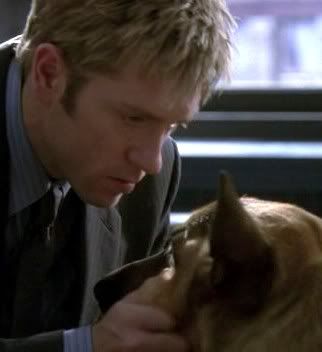

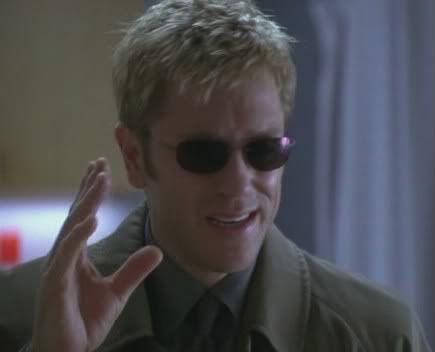
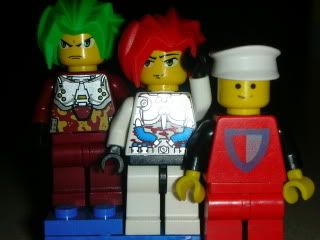
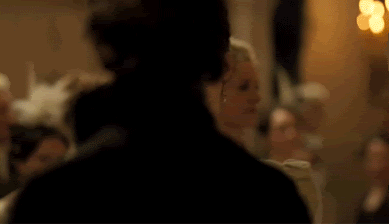

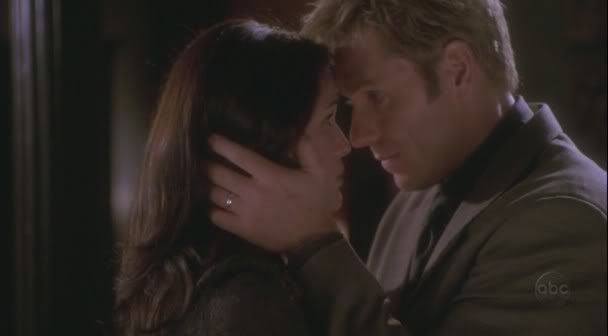
 where he leaves his gun in his locker and the others assure him that they have his back,you can't help but wonder if he feels that vunerability,etc. all over again and that was one reason he held onto the gun for as long as he did?
where he leaves his gun in his locker and the others assure him that they have his back,you can't help but wonder if he feels that vunerability,etc. all over again and that was one reason he held onto the gun for as long as he did?